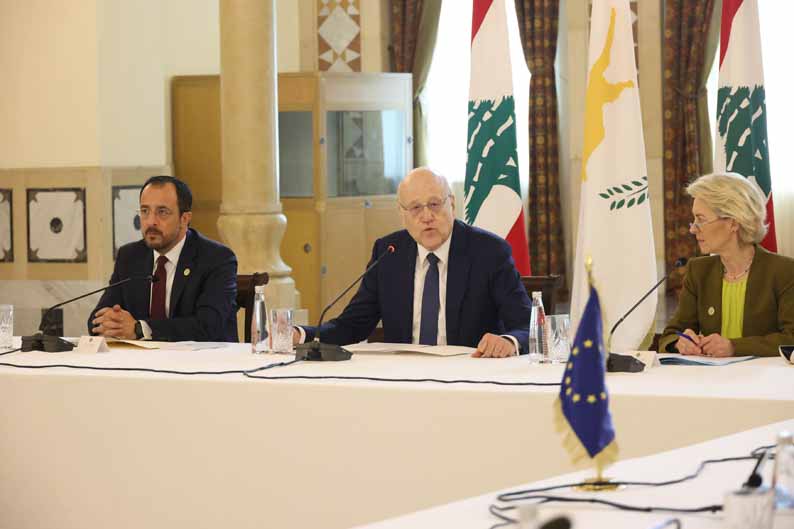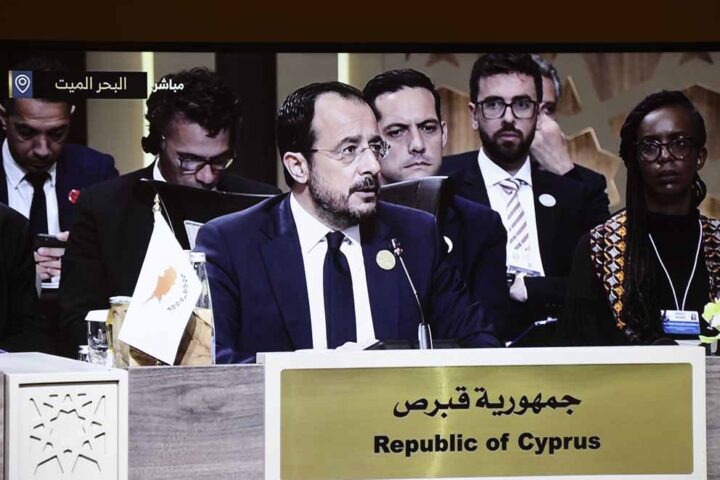The European Union unveiled a €1 billion economic aid package for Lebanon in exchange for the country slowing migration flows, especially amid a sharp rise in Syrian refugees headed to Cyprus and Italy.
However, despite the welcome boost to Beirut’s cash-strapped coffers, Lebanon still needs much more if it is to resolve its dire financial situation, with political infighting blocking much-needed reforms to unlock a further $3 bln from the IMF.
Speaking in Beirut, accompanied by Cyprus President Nikos Christodoulides, Commission President Ursula von der Leyen said most of the aid package, aimed to bolster the country’s “overall security and stability,” will go to boost border control to halt the flow of asylum seekers and migrants.
The deal follows other EU aid packages for countries such as Egypt, Tunisia and Mauritania to fortify their borders. It comes against a backdrop of increasing hostility toward Syrian refugees in Lebanon and a major surge in irregular migration of Syrian refugees from Lebanon to Cyprus, according to the Associated Press.
The bulk of the aid distribution that will start this year and last till 2027, will go to support Syrian refugees “and other vulnerable groups” in Lebanon, as well as to bolster Lebanese security services in enforcing border and migration control, according to figures provided by the Cypriot government.
An unspecified amount would go to Lebanese fishermen, to discourage them from selling their boats to smugglers.
Von der Leyen said the EU will also work on a “more structured approach to voluntary return” of Syrian refugees “in close cooperation with” the U.N. refugee agency. The bloc will continue to maintain “legal pathways” for resettlement of refugees in Europe, she said.
Lebanon’s caretaker Prime Minister Najib Mikati praised the package, saying that “Lebanon’s security is security for European countries and vice versa,” and that an escalation of the crisis ”will not be limited to Lebanon but will extend to Europe.”
Lebanon is burdened with more than 800,000 registered Syrian refugees and hundreds of thousands more are unregistered, almost a third of the country’s entire population.
Meanwhile, Cypriot authorities complain the island nation has been overwhelmed by irregular migration of Syrian asylum seekers, many of them coming on boats from Lebanon or via Turkey.
The UNHCR in Lebanon said it had verified 59 “actual or attempted” departures by boats carrying a total of 3,191 passengers from Lebanon between January and mid-April.
Last month, Cyprus suspended processing of Syrian asylum applications, and human rights groups accused the Cypriot coast guard of forcibly turning back five boats carrying about 500 asylum seekers coming from Lebanon.
Thursday’s aid announcement comes ahead of the annual fundraising conference for the Syrian crisis in Brussels later this month. After 13 years of civil war, donor fatigue has set in while the world’s attention is occupied by the humanitarian fallout of more recent conflicts in Ukraine and Gaza.
Historic day
The Cypriot president said Thursday was a “historic day” and called for European officials to go farther and declare some areas of Syria safe for return.
“The current situation is not sustainable for Lebanon. It is not sustainable for Cyprus, it is not sustainable for the European Union,” Christodoulides said.
Cyprus has the highest number of asylum applications per capita in the European Union
But not all Lebanese officials are convinced the European aid would solve the problem.
Lebanese Forces party head Samir Geagea told The Associated Press earlier this week that European authorities are mainly concerned “that the refugees don’t go to Europe.”
“For us the problem is that we cannot have our country drowning in illegal Syrian refugees,” Geagea said, urging for Syrians to be sent back to either government or opposition-held areas of the neighbouring country.
Ursula von der Leyen said the aid was designed to shore up basic services such as education and health care.
She also appealed for the country to adopt reforms, saying, “Lebanon needs a positive economic momentum to give opportunities to its businesses and citizens.”
Von der Leyen said the EU was committed to keeping “legal pathways open to Europe” in place and resettling refugees in the 27-member bloc.
“At the same time, we count on your good cooperation to prevent illegal migration and combat migrant smuggling,” she added.
Meanwhile, Amnesty International and seven other civil society organisations, urged the Lebanese authorities and the European Union to respect their obligations under international law and not forcibly return refugees to Syria as long as the conditions for safe, voluntary and dignified returns are not met.
In recent months, the Lebanese government has advocated for an EU-Lebanon migration deal under which the EU, according to media reports, would provide additional financial support to Lebanese security agencies to prevent people, including Syrian refugees, Lebanese individuals and other nationals living in Lebanon, from trying to reach European states.
The deal would also expand return assistance programming to so-called “safe areas” inside Syria to incentivise refugee returns.
This is the latest in a series of migration cooperation deals negotiated by the EU that seeks to enlist third countries’ assistance on border control and that are premised on the abdication of responsibility for people seeking safety.
These deals expose individuals to human rights risks, erode asylum protection and undermine the international protection system as a whole, Amnesty said.
These agreements evade public, parliamentary, and judicial oversight in the EU and partner countries and consistently lack adequate monitoring and oversight mechanisms to ensure the EU is not complicit in human rights violations, it added.










